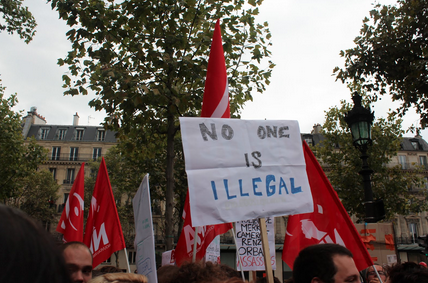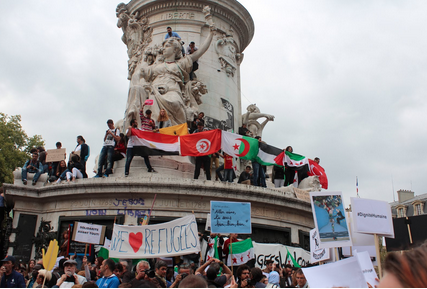Lily is currently studying International Affairs and Economics at Sciences Po in Paris, France.
Since the beginning of the conflict in Syria, about 4 million refugees have fled the region, seeking safety from the violence and destruction left in the wake of ISIS and by the Assad regime’s brutal policies.[1] As people move westward, a huge amount of pressure has fallen on Europe, and consequently the European Union (EU), to accommodate massive numbers of migrants running for their lives.
While responses from European citizens and individual countries have been mixed, from sympathetic to unwelcoming, all European parties undeniably have a stake in establishing an effective response to the crisis. More than just a matter of humanitarianism or moral responsibility, the refugee crisis has highlighted economic and political tensions in the EU and has added pressure for the Union to demonstrate its decision making capability.
In early September, I joined the masses at Paris’s historic Place de République, who gathered in solidarity to welcome refugees. Demonstrators carried signs with handlettered phrases reading “Sommes-nous dans un état de droit?” Are we in a state of rights? and “Solidarité avant tout” Solidarity before everything, among others. The atmosphere was electric as some spoke to the crowd through megaphones while others tied together the flags of states including Syria, Palestine and Tunisia in a demonstration of unity. Demonstrators also called on François Hollande, the president of France and an important member of the European Council, to take action.
The demonstration reflected the Europe-wide sense of urgency for a plan of action. This tension, combined with festering discord over economic hardships, specifically affecting overburdened “entry states” such as Greece and Italy, has exacerbated pressures on the EU. The Union is hard-pressed to validate itself as an entity capable of making tough but critical decisions. It is imperative that the Union act quickly to institute a common policy, including mandatory refugee uptake quotas, to alleviate pressures on entry states and to demonstrate a renewed sense of solidarity.
The EU cannot afford to substitute a surface measure for actual policy as it has in the past, or it will risk losing the support of its member states, particularly those who already feel alienated or ignored by previous policies like harsh conditionality and austerity. However, if handled correctly, the refugee crisis could serve as a strangely packaged blessing for the EU, giving it a chance to make a statement of solidarity and reinstitute unity.
From the economic crises in Italy, Spain, and Greece, to the resulting strengthening of nationalist sentiments throughout Europe, the “unity” of the European Union has become increasingly questionable, a circumstance that can be attributed to the Union’s lack of meaningful policy making. For example, economists have stated that the European Central Bank’s $1.1 trillion financial stimulus package, unveiled earlier this year, will not be effective in ending the crisis because it was not instituted early enough.[2]
The political unrest and social turbulence have since reached dangerously high levels, threatening the collapse of the entire European Project. The failure of the EU to establish a policy on migration during recent emergency meetings also attests to its inability to form unified policies. In light of the current unstable political and economic climate, the EU must take decisive action before the crisis reaches a breaking point.
Warning signs have already foreshadowed the challenges to unity that the EU will face if it fails to implement effective migration policy. This was exemplified when Germany instituted border control checkpoints with Austria, despite the previously established guarantee of free movement of persons within EU territory.
European states are also clearly overburdened by the sheer number of refugees arriving and their lack of resources to accommodate them. Even in Paris, which is far from the overburdened points of entry, I have noticed a considerable number of families sleeping on the streets and have wondered if they were among the many seeking hope in Europe.
To have a truly effective policy, the EU must establish compulsory refugee quotas relative to the population and economy of each member state. It must assist strained “entry point” states such as Croatia, Italy, Greece, and Hungary with increased human capital for the overwhelming task of processing immigrants. It must also allow for more efficient transport of refugees from entry states to interior European states. A quota is critical because, as demonstrated up to this point, there is a divide between individual states’ willingness to accept refugees.
Additionally, while states like Germany have been praised in the media for accepting high numbers of applications for asylum, their acceptance rates compared to population size are relatively low (Germany has accepted about 50 applications per 100,000 citizens).[3] If states institute quotas relative to their population size, the possibility of refugees “overrunning” the native population, a concern for ultranationalist supporters, and thus for the EU, is eliminated.[4]
The capacity of member states’ economies and level of development should be accounted for and accommodated accordingly. For example, it is realistic to suppose that countries such as Hungary (ranked 58 by the World Bank according to GDP) and the Czech Republic (51) will need a significant amount of processing assistance, not only because they are overstrained “entry points,” but also because they are not as developed as other states in the EU.[5]
While the situation is formidable, the Union must answer the concerns of its citizens and address the ever growing number of refugees, who have betted their lives and the lives of their children on the promise of a better future in Europe. The EU must also view the crisis’s resolution as a necessity for the survival of the European Project and strive to develop a policy that will be recorded as a triumph rather than yet another failure.
[1] The Economist. “Europe’s Migrant Acceptance Rates.” 2015. Web.
[2] Spence, Peter. “ECB Doing ‘Too Little, Too Late’ To Rescue Eurozone, Experts Warn.” The Telegraph 2015. Web.
[3] The Economist. “Europe’s Migrant Acceptance Rates.” 2015. Web.
[4] Jobbik: Movement for a Better Hungary. “Manifesto.” N.p., 2015. Web.
[5] The World Bank. Gross Domestic Product 2014. 2014. Web.




